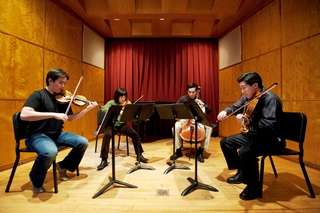|
Back
Band of Siblings New York
Gilder Lehrman Hall, The Morgan Library & Museum
03/09/2010 -
Samuel Barber: String Quartet, op. 11
Sebastian Currier: Next Atlantis, for string quartet and pre-recorded sound (LifeMusic Commission and New York premiere)
Ludwig van Beethoven Quartet #14 in C-sharp Minor, op. 131
Ying Quartet: Frank Huang, Janet Ying (Violins), Philip Ying (Viola), David Ying (Cello)

The Ying Quartet (© Adam Fenster)
Until last year, Ying Quartet was literally a band of brothers. (Or three brothers and one sister!). Retiring First Violin Timothy Ying was replaced by Frank Huang, but these four still play like a dream team. They are energetic, imaginative and have worked for nearly a decade in programming contemporary works.
Actually, their “modern” music should not be a compliment. Nobody thinks that the Budapest Quartet was avant-garde for playing Bartók. Nor is the Juilliard Quartet praised for playing Elliot Carter. Since chamber-music audiences are more rarefied than orchestral or operatic audiences, their music can be more their own choice than a financial question.
Ying Quartet, presently quartet-in-residence at that abode of contemporary music, Eastman Rochester Conservatory, gave two homages last night. First to Samuel Barber for his 100th Anniversary. And second, the New York premiere of a composer with whom they had been associated before, Sebastian Currier.
Mr. Currier, who was in attendance, had pre-recorded the sounds of water behind the quartet, but this was neither baptismal water, nor Tan Dun’s water the magician. Instead, this was the water of New Orleans, the water of floods and sewers, above and below ground. The sounds of water were the wounds of water, sometimes of sprays, sometimes the drips in echoing cisterns, sometimes sheets of rain, but the constancy of the sounds was always threatening.
Against this Ying Quartet played sounds which were sometimes harsh, sometimes melodic. A strain from Bourbon Street, a few lines of crying, many measures that were not memorable in themselves, but which amplified the water as the water amplified the music. New Atlantis (the “too-possible future”, as Mr. Currier says) was less music than an event transformed to music and nature, and in that, the composer was successful.
Of the other two works, I inconceivably compared the Adagio, first movement of Beethoven’s seven-movement C-sharp Minor Quartet, to the Adagio of the Barber Quartet played barely 30 minutes before.
The latter has, ever since the movie Platoon, been used as background for everything from margarine adsto funerals, and is the picture of grief. That is, the Barber work is a picture within a frame saying “Look at me. I am sadness and desolation, and my Intelligent Creator, Samuel Barber, made me soar into radiance and back into reconciliation. Was he not a wonderful composer?”
The Beethoven Adagio is not the picture of grief. It is grief itself. It isn’t the work of a Creationist, but comes out of nothingness, with a few notes, and organically builds and grows and becomes… well, whatever it becomes.
Listening to the entire Beethoven work, it was obvious that this was not ethereal. This was the world of a man. The opening had its own melancholy, the first movement gradually grew cheerful, and this went onto an operatic recitative and that dreadfully difficult Presto.
The annotator kept writing about “smoothness” for the Quartet to succeed. But I think the unity comes from diversity, from sudden changes, from jokes and dances to the fury–and finally the mocking fury of the end. As if Beethoven was about to say, “Smoothness is for Haydn the composer. I am Beethoven the Man, warts and all.”
The Ying Quartet played with some erratic changes, but this only made it better. They punctuated the Presto and played the canon/fugues with mock-dainty strokes. At the end, we weren’t thinking of Beethoven or Ying, but something more humane.
The opening Barber was notable not for the Adagio but, at the age of 25, the young composer’s debt to other writers. The second theme of the opening was almost Renaissance modal, the introduction of the short end movement was pure Brahms. The longer original third movement, played by Ying Quartet, was lighter and brighter and less original.
A note that the Morgan Library had purchased the original score of the Barber Quartet, which is on exhibition outside the concert hall. Incidentally, it looked almost effete next to the major exhibition of Assyrian clay seals, whose etchings were fierce and wild. Even in their antiquity, they are far more life-like than Mr. Barber’s so-precious jottings.
The Ying Quartet
Harry Rolnick
|